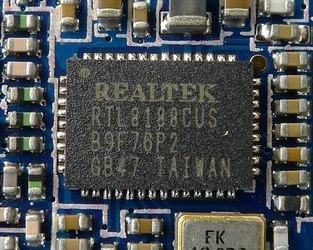Rtl8188eu Driver
Miss Realtek rtlwifi drivers or get ‘No WiFi Adapter Found‘ issue? There’s now an Ubuntu PPA that contains the most recent rtlwifi drivers for Ubuntu, Linux Mint, and derivatives.
So instead of troubleshooting I just bought a mini USB Realtek RTL8188EU device for $10, which worked fine until today I upgraded Windows 10 with the automatic updates. Now the Realtek doesn't show any network. I tried restarting few times and different USB ports. I tried to disable/enable. Install/Uninstall from the device manager. Wifi driver support for rtl8188eu, rtl8188eus and rtl8188etv chips and working under the new linux kernel (4.17.x). More information about your wifi device can be found here: Compiling & Building Dependencies. To compile the driver, you need to have make and a compiler installed.
Free drivers for RealTek RTL8188EU. Found 1 file for Windows 10, Windows 10 64-bit, Windows 8.1, Windows 8.1 64-bit, Windows 7, Windows 7 64-bit. Select driver to download. I installed this driver rtl8188eugit-r0-bh2vusolo.ipk but it detects the usb stick in interface. But when I go to do a search wifi network does not detect wifi reiti black hole 2.1.0.1.
Without building from the source code, the “Linux Mint Türkiye” team maintains a PPA that contains the most recent wireless drivers with DKMS support for rtl8723bu, rtl8822bu, rtl8188eu, rtl8188fu, rtl8192cu, rtl8192du, rtl8192ee, rtl8192eu, rtl8192fu, rtl8723au, rtl8723bu, rtl8723de, rtl8723ds, rtl8723du, rtl8812au, rtl8814au, rtl8821ce, rtl8821cu, rtl8822bu devices.
If you have a RealTek USB WiFi Adapter or a laptop / notebook with built-in chipset in the previous list, do following steps may help you install the drivers in Ubuntu 18.04, Ubuntu 20.04, Ubuntu 20.10, Linux Mint 20.
1.) First open terminal either from the system application launcher or by pressing Ctrl+Alt+T on keyboard.
2.) Then run command to add the Ubuntu PPA:

3.) Then open Synaptic package manager, click Reload button refresh package cache, search either rtl or dkms.
Scroll down to find out the list of driver packages, then right-click on the one for your chipset and select ‘Mark for Installation’, finally click on Apply button to install it.
Or you can run command in terminal to install the driver (replace rtl8723de-dkms in the code):
4.) The wireless network should work immediately after you installed the driver. You can manually unload and re-load the kernel module via commands (replace rtl8723de-dkms in the code):
Uninstall the RealTek Wifi Driver:
To remove the driver, either use Synaptic package manager or run apt command in terminal:
And remove the Ubuntu PPA via command:
NOTE: If you’re using Raspbian 2015.01 or later, the Raspberry Pi kernel 3.18 now includes this driver—you don’t need to compile anything and this tutorial is now irrelevant!
Rtl8188eu Driver Windows 7 32 Bit
Raspberry Pi enthusiasts like to use Realtek 8188eu-based Wi-Fi adapters. Known as “micro” Wi-Fi adapters, they are small and inexpensive. For example, the TP-LINKWN725N V2 can be found for under $20 (the V1 and V3 use different chipsets. Thanks for making everything confusing, TP-LINK!).
As of October 2014 and Linux 3.12.29+, the driver for this Wi-Fi adapter isn’t available in the Raspberry Pi Linux kernel, so these Wi-Fi adapters are not supported out-of-the-box, despite otherwise you may find on the Internet. Definitely, they don’t work in a plug-and-play manner.
You can get these adapters to work by using an out-of-tree driver (i.e. a driver not included with the Linux kernel). People on the Internet have resorted to doing all these silly things like downloading random kernel modules or compiling the vendor Linux kernel trees from scratch trying to get this driver to work. You’re probably reading this article because you, like me, thought it was silly to chase files around on some random Internet forum.
The source code for the 8188eu driver is available on GitHub. Rather than trying to look for random files and hope they work, you can keep the source for the module on your Raspberry Pi and recompile the module as needed. Below are copy-and-pastable instructions to do this on Raspbian.
Make sure you have a compiler, etc installed.
Download the source code for the driver. I prefer to put source code for stuff like this somewhere convenient in my home directory, like ~/src/drivers/.
Now you have the source code for the driver, you need to get the source code for the kernel running on the Raspberry Pi. Finding the source code for the currently-running kernel on the Raspberry Pi can be a pain. I like to use Hexxeh’s rpi-source tool, which you can download, install, and run:
If you get an error about GCC, use the “skip-gcc” flag:
Now, compile the driver:

Your Wi-Fi should be working, though you’ll need to configure it (configuring it is out of scope for this article).
You can double check whether the adapter is recognized by looking at the output of (assuming you’ve only one Wi-Fi adapter, it will be named wlan0):
If you see nothing, the driver may have been installed wrong or your Wi-Fi adapter not working. If you see something like:
Then you are good to go!
Rtl8188eu Driver Windows
All of this seemed like a lot of work compared to hunting down the file, right? Except, it isn’t: when you update the kernel on your Raspberry Pi and reboot, the Wi-Fi will stop working because it will no longer have an appropriate driver. Rather than having to go on a witch hunt for files, you can simply recompile the driver again while offline:
The above is all you need to turn your Raspberry Pi into a working Wi-Fi client.
If you want to use your shiny new Wi-Fi enabled Raspberry Pi as an access point, there’s a gotcha with Realtek Wi-Fi adapters (I’ve found this true of both the 8188eu and 8192cu chips): they won’t work with hostapd as included with Raspbian or Arch Linux. You’ll need to use a custom hostapd, such as this one posted by Jens Segers, to get a working access point.